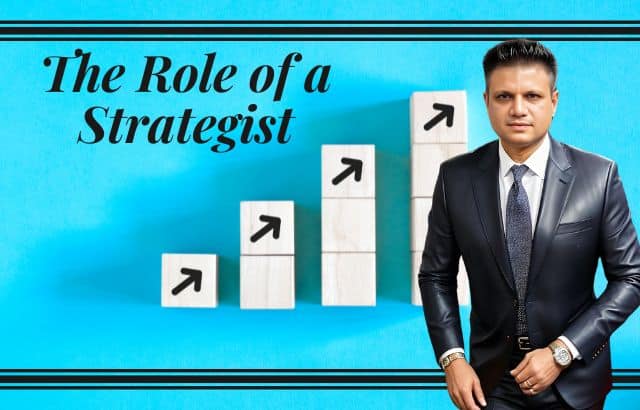In the world of sales, mastering communication is more than just knowing the product—it’s about connecting with people on a deeper level. Whether you’re trying to turn leads into loyal customers or simply build trust, establishing rapport is key. Hirav Shah, one of India and the USA’s top business strategists and founder of Bizz6, offers valuable advice on how to make meaningful connections that can lead to long-lasting business success.
Table of Contents
The Power of Rapport in Sales

Sales isn’t just about closing deals; it’s about creating relationships. Prospects are not just looking for a product—they’re looking for trust, understanding, and value. As Hirav Shah emphasizes, building rapport is the foundation that propels relationships from initial contact to a lasting partnership. So, how can you ensure you’re laying this strong foundation? Here’s a complete guide based on Hirav Shah’s expert advice.
How to Establish Rapport: A Comprehensive Guide

1. Effective Listening

The first step in building rapport is to listen, truly listen. Good listening is a rare skill, and when done well, it shows respect and genuine interest. When you’re having a conversation, give your full attention. Imagine if someone were distracted while you spoke—how would you feel? Show that you value their words by avoiding distractions like checking your phone or looking around the room.
Example: If you’re in a sales meeting and a prospect mentions their company’s recent challenges, instead of quickly jumping in with a solution, take a moment to process their concerns. Acknowledge what they’ve said before offering your insights, saying something like, “It sounds like this has been a tough period for you. Can you tell me more about the impact it’s had?”
2. Ask Pertinent Questions

To build rapport, you must engage with curiosity—not just launch into a rehearsed pitch. Ask questions that allow you to learn more about the other person’s values and challenges. Don’t make assumptions; instead, let the conversation unfold naturally.
Example: Instead of starting with a product pitch, ask open-ended questions like, “What’s the biggest challenge you’re currently facing in your industry?” or “How do you approach new initiatives in your business?” By showing interest in their specific situation, you begin to develop a deeper connection.
3. Research and Fact-Finding

Preparation is a key element in building rapport. Before meeting a prospect or client, take time to research their background. What have they accomplished? What challenges are they facing? What do they value most in their business?
Example: If you know that your prospect recently attended a marketing conference or is working on a big project, bring it up during your conversation. “I saw you presented at the [specific conference] last month. How was the experience for you?” This shows you’ve invested time in understanding their world, which can be a great conversation starter.
4. Check Your Frame of Mind & Disposition

Before any interaction, take a moment to assess your mindset. Enter each conversation with a sense of confidence and positivity. When you believe in the value you bring, you can be more authentic and effective in building rapport.
Example: If you’re meeting a potential client and you’re nervous about what to say, focus on the value you bring to the table. Remind yourself of your expertise and experience—this will help you to approach the conversation from a place of confidence rather than self-doubt.
5. Be Real and Authentic

In today’s world, people crave authenticity. Be real with your prospects and clients—show them the human side of you. Empathy is an important tool for building trust. Especially in the wake of the pandemic, many of us have experienced similar challenges, like balancing work and personal life.
Example: If the prospect is working from home, you might say, “I totally understand what you mean about the challenges of working remotely. It’s been a journey for all of us!” Sharing a personal experience can quickly create a sense of camaraderie and trust.
6. Find Mutuality

Finding common ground is one of the quickest ways to build rapport. Research your prospects and look for shared interests—whether it’s a professional achievement or something as simple as a mutual love for a sport.
Example: If you discover that your prospect is a fan of a certain sports team, you could mention, “I saw that your team won the big game last weekend—congrats!” Finding and mentioning mutual interests can create a bond, making the conversation feel more personal and less transactional.
The Role of a Business Strategist in Building Rapport

As a Business Strategist and the founder of Bizz6, Hirav Shah works with companies to diagnose, transform, and accelerate their success. His strategies not only focus on enhancing business performance but also on establishing solid relationships that drive long-term results.
For example, one of Hirav Shah’s key strategies is helping businesses identify shared values with their clients. By aligning business goals with personal values, a business can strengthen its connections with customers and prospects.
Example from Hirav Shah’s work: When working with a client in the tech industry, Hirav Shah helped them identify their shared commitment to innovation and sustainability. By incorporating these values into the sales conversation, they built stronger rapport with prospects who shared these same priorities.
Frequently Asked Questions:Ask Hirav

Q: How do I start building rapport in a cold call or initial meeting?
A: Start by asking an open-ended question related to the prospect’s current needs or challenges. Avoid jumping straight into your sales pitch. Show genuine curiosity and be patient in allowing the conversation to unfold.
Q: What should I do if the prospect isn’t engaging in the conversation?
A: It could be a sign that the person is distracted or not yet ready to engage. Try shifting the focus of the conversation to something personal or more relatable, such as mutual interests or their company’s recent achievements.
Q: How do I maintain rapport over time, especially after the initial meeting?
A: Follow up with personalized communication. A simple message showing that you remembered something they shared with you can go a long way. For example, “I remember you mentioned working on [project]. I’d love to hear how it’s going.”
Final Thoughts

Building rapport in sales is all about creating a human connection. As Hirav Shah advises, focus on humanizing the conversation and approach each meeting with an open, curious mindset. By listening actively, asking meaningful questions, and being authentic, you’ll not only build trust but also create lasting relationships that will propel your business forward.
Remember, it’s not just about closing a deal—it’s about opening the door to a long-term relationship that can lead to mutual success.










